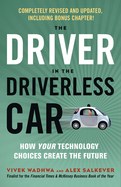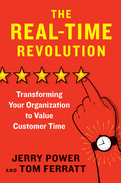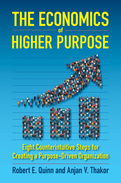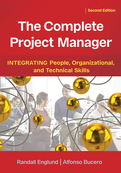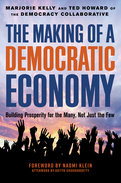Search Results: ""
Results 1039-1044 of 1358
Tech experts Vivek Wadhwa and Alex Salkever describe dozens of astonishing technological advances in this fascinating and thought-provoking book, which asks what kind of future lies ahead—Star Trek or Mad Max?
Breakthroughs such as personalized genomics, drones, self-driving vehicles, and artificial intelligence could make our lives healthier, safer, and easier. On the other hand, the same technologies raise the specter of a frightening future—eugenics, a jobless economy, a complete loss of privacy, and ever-worsening economic inequality.
Wadhwa says that we need to ask three questions about every emerging technology: Does it have the potential to benefit everyone equally? What are the risks and the rewards? And does it promote autonomy or dependence? This edition is updated throughout and includes a new chapter on quantum computing, which promises vastly increased processing times—and vastly increased security risks. In the end, our future is up to us; our hands may not be on the wheel, but we will decide the driverless car's destination.
Breakthroughs such as personalized genomics, drones, self-driving vehicles, and artificial intelligence could make our lives healthier, safer, and easier. On the other hand, the same technologies raise the specter of a frightening future—eugenics, a jobless economy, a complete loss of privacy, and ever-worsening economic inequality.
Wadhwa says that we need to ask three questions about every emerging technology: Does it have the potential to benefit everyone equally? What are the risks and the rewards? And does it promote autonomy or dependence? This edition is updated throughout and includes a new chapter on quantum computing, which promises vastly increased processing times—and vastly increased security risks. In the end, our future is up to us; our hands may not be on the wheel, but we will decide the driverless car's destination.
Time has become a precious commodity, so business leaders who can save their customers' time more effectively than competitors do will win their loyalty. This book shows how it's done.
Business survival requires valuing what customers value—and in our overworked and distraction-rich era, customers value their time above all else. Real-time companies beat their rivals by being faster and more responsive in meeting customer needs.
To become a real-time company, as top scholars Jerry Power and Tom Ferratt explain, you need a real-time monitoring and response system. They offer detailed advice on how to put procedures in place that will collect data on how well products or services are saving customer time; identify strengths, weaknesses, threats, and opportunities; and specify innovations needed to save even more customer time.
Where should leaders look to innovate? Powers and Ferratt say to search every step in the life of a product or service, from development to production to usage. And for each step, they identify four possible levers for innovation: the design of the products or services themselves, the process used to produce them, the data that can be gathered on their use, and the people who make or provide the product or service.
The book features dozens of examples of companies that are getting it right and the innovations they used to help their customers save time, all while helping themselves to a hefty slice of market share. This is a comprehensive, authoritative guide to thriving in a revolution that is sweeping every industry and sector.
Business survival requires valuing what customers value—and in our overworked and distraction-rich era, customers value their time above all else. Real-time companies beat their rivals by being faster and more responsive in meeting customer needs.
To become a real-time company, as top scholars Jerry Power and Tom Ferratt explain, you need a real-time monitoring and response system. They offer detailed advice on how to put procedures in place that will collect data on how well products or services are saving customer time; identify strengths, weaknesses, threats, and opportunities; and specify innovations needed to save even more customer time.
Where should leaders look to innovate? Powers and Ferratt say to search every step in the life of a product or service, from development to production to usage. And for each step, they identify four possible levers for innovation: the design of the products or services themselves, the process used to produce them, the data that can be gathered on their use, and the people who make or provide the product or service.
The book features dozens of examples of companies that are getting it right and the innovations they used to help their customers save time, all while helping themselves to a hefty slice of market share. This is a comprehensive, authoritative guide to thriving in a revolution that is sweeping every industry and sector.
“In this precise primer on firearms practices and policies, progressive talk-show host Hartmann examines the history of routine gun usage and extreme gun violence and assesses the influence of gun ownership on contemporary political, economic, and social norms…A brief but powerful analysis of a searing national crisis.” —Booklist
Taking his typically in-depth, historically informed view, Thom Hartmann examines how guns have played important roles throughout American history, from early European settlement to the Revolutionary War and Manifest Destiny, through the use of Slave Patrols in the Deep South (which became the “well-regulated militias” so debated in 1787), to the assassination of John F. Kennedy and recent school massacres.
Looking at the present, Hartmann documents how inequality in America and the number of people killed in mass shootings have grown together over the last fifty years. Finally, he identifies a handful of common-sense and powerful solutions that would address the issue at different levels: from getting money out of politics to get the National Rifle Association out of lobbying, to passing laws that would treat gun ownership like car ownership (title, license, insurance), to addressing the social despair and economic inequality that drive violent crime and mass shootings.
Taking his typically in-depth, historically informed view, Thom Hartmann examines how guns have played important roles throughout American history, from early European settlement to the Revolutionary War and Manifest Destiny, through the use of Slave Patrols in the Deep South (which became the “well-regulated militias” so debated in 1787), to the assassination of John F. Kennedy and recent school massacres.
Looking at the present, Hartmann documents how inequality in America and the number of people killed in mass shootings have grown together over the last fifty years. Finally, he identifies a handful of common-sense and powerful solutions that would address the issue at different levels: from getting money out of politics to get the National Rifle Association out of lobbying, to passing laws that would treat gun ownership like car ownership (title, license, insurance), to addressing the social despair and economic inequality that drive violent crime and mass shootings.
Two distinguished scholars offer eight steps to help organizations discover and embrace an authentic higher purpose—something that will dramatically improve every aspect of any enterprise, including the bottom line.
What does a lofty notion like purpose have to do with business basics like the bottom line? Robert E. Quinn and Anjan J. Thakor say pretty much everything. Leaders and managers are taught that employees are self-interested and work resistant, so they create systems of control to combat these expectations. Workers resent these systems, and performance suffers. To address the performance issues, managers double down on the coercion, creating a vicious cycle and a self-fulfilling prophecy.
But there is a better way. Quinn and Thakor show that when an authentic higher purpose permeates business strategy and decision-making, the cycle is broken. Employers and employees see themselves as working together toward an inspiring goal, not just trying to hit quarterly targets. They fully engage, become proactive contributors, and, ironically, easily exceed those quarterly targets.
Based on their widely acclaimed Harvard Business Review article, Quinn and Thakor offer eight sometimes surprising steps for shifting from a transaction-oriented mind-set focused on constraints to a purpose-oriented mind-set focused on possibility. This iconoclastic book will help any organization discover its authentic purpose and weave it into the fabric of everything it does, leading to unprecedented levels of personal satisfaction, service and product innovation, and economic growth.
What does a lofty notion like purpose have to do with business basics like the bottom line? Robert E. Quinn and Anjan J. Thakor say pretty much everything. Leaders and managers are taught that employees are self-interested and work resistant, so they create systems of control to combat these expectations. Workers resent these systems, and performance suffers. To address the performance issues, managers double down on the coercion, creating a vicious cycle and a self-fulfilling prophecy.
But there is a better way. Quinn and Thakor show that when an authentic higher purpose permeates business strategy and decision-making, the cycle is broken. Employers and employees see themselves as working together toward an inspiring goal, not just trying to hit quarterly targets. They fully engage, become proactive contributors, and, ironically, easily exceed those quarterly targets.
Based on their widely acclaimed Harvard Business Review article, Quinn and Thakor offer eight sometimes surprising steps for shifting from a transaction-oriented mind-set focused on constraints to a purpose-oriented mind-set focused on possibility. This iconoclastic book will help any organization discover its authentic purpose and weave it into the fabric of everything it does, leading to unprecedented levels of personal satisfaction, service and product innovation, and economic growth.
“This is an important book; it is a necessary book. It comprehensively addresses the rapidly expanding role of the project manager, a role that is striving to keep up with the corresponding expansion in the definition of project success.”
—from the Foreword by Michael O'Brochta
This new edition of a classic, bestselling guide addresses the soft project management skills that are so essential to successful project, program, and portfolio management. Mastering leadership, negotiation, conflict resolution, change management, and organizational politics has always been key to project manager success. This book demonstrates the why and how of creatively applying soft project management skills in these areas and shows how to develop, adjust, and hone these skills given the forces and trends in today's business world.
Using real-world stories and case studies to model how to implement these skills, Englund and Bucero illustrate how the right mix of soft and hard professional skills can help create an environment that supports greater project success. This second edition features new sections on agile project management, ethics, business analysis, management across generations and between cultures, and more. It maps well to recent topic updates in the sixth edition of the Project Management Body of Knowledge.
This book is a valuable manual for all the complex interpersonal skills necessary for project managers' success and will help them develop a more complete portfolio of skills, knowledge, and attitudes to serve as road maps to greater project success.
—from the Foreword by Michael O'Brochta
This new edition of a classic, bestselling guide addresses the soft project management skills that are so essential to successful project, program, and portfolio management. Mastering leadership, negotiation, conflict resolution, change management, and organizational politics has always been key to project manager success. This book demonstrates the why and how of creatively applying soft project management skills in these areas and shows how to develop, adjust, and hone these skills given the forces and trends in today's business world.
Using real-world stories and case studies to model how to implement these skills, Englund and Bucero illustrate how the right mix of soft and hard professional skills can help create an environment that supports greater project success. This second edition features new sections on agile project management, ethics, business analysis, management across generations and between cultures, and more. It maps well to recent topic updates in the sixth edition of the Project Management Body of Knowledge.
This book is a valuable manual for all the complex interpersonal skills necessary for project managers' success and will help them develop a more complete portfolio of skills, knowledge, and attitudes to serve as road maps to greater project success.
Our economy is designed by the 1 percent, for the 1 percent. This book offers a compelling vision of an equitable, ecologically sustainable alternative that meets the essential needs of all people.
We live in a world where twenty-six billionaires own as much wealth as half the planet's population. The extractive economy we live with now enables the financial elite to squeeze out maximum gain for themselves, heedless of damage to people or planet. But Marjorie Kelly and Ted Howard show that there is a new economy emerging focused on helping everyone thrive while respecting planetary boundaries.
At a time when competing political visions are at stake the world over, this book urges a move beyond tinkering at the margins to address the systemic crisis of our economy. Kelly and Howard outline seven principles of what they call a Democratic Economy: community, inclusion, place (keeping wealth local), good work (putting labor before capital), democratized ownership, ethical finance, and sustainability. Each principle is paired with a place putting it into practice: Pine Ridge, Preston, Portland, Cleveland, and more.
This book tells stories not just of activists and grassroots leaders but of the unexpected accomplices of the Democratic Economy. Seeds of a future beyond corporate capitalism and state socialism are being planted in hospital procurement departments, pension fund offices, and even company boardrooms.
The road to a system grounded in community, democracy, and justice remains uncertain. Kelly and Howard help us understand we make this road as we walk it by taking a first step together beyond isolation and despair.
We live in a world where twenty-six billionaires own as much wealth as half the planet's population. The extractive economy we live with now enables the financial elite to squeeze out maximum gain for themselves, heedless of damage to people or planet. But Marjorie Kelly and Ted Howard show that there is a new economy emerging focused on helping everyone thrive while respecting planetary boundaries.
At a time when competing political visions are at stake the world over, this book urges a move beyond tinkering at the margins to address the systemic crisis of our economy. Kelly and Howard outline seven principles of what they call a Democratic Economy: community, inclusion, place (keeping wealth local), good work (putting labor before capital), democratized ownership, ethical finance, and sustainability. Each principle is paired with a place putting it into practice: Pine Ridge, Preston, Portland, Cleveland, and more.
This book tells stories not just of activists and grassroots leaders but of the unexpected accomplices of the Democratic Economy. Seeds of a future beyond corporate capitalism and state socialism are being planted in hospital procurement departments, pension fund offices, and even company boardrooms.
The road to a system grounded in community, democracy, and justice remains uncertain. Kelly and Howard help us understand we make this road as we walk it by taking a first step together beyond isolation and despair.


